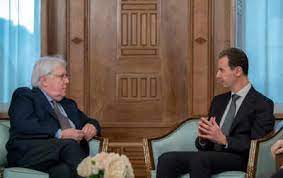UNITED NATIONS: Syria’s president agreed to open two new crossing points from Turkey to the country’s rebel-held northwest to deliver desperately needed aid and equipment to help millions of earthquake victims, the United Nations announced Monday.
UN Secretary-General Antonio Guterres welcomed the decision by Syrian leader Bashar Assad to open crossing points at Bab Al-Salam and Al Raée for an initial period of three months. Currently, the UN has only been allowed to deliver aid to the northwest Idlib area through a single crossing at Bab Al-Hawa.
The announcement followed a meeting in Damascus earlier Monday between Assad and UN humanitarian chief Martin Griffiths, who spent the weekend witnessing the devastation caused by the magnitude 7.8 earthquake that ravaged southern Turkey and northwestern Syria.
Guterres’ official announcement came during a closed meeting of the UN Security Council where diplomats said Griffiths announced Assad’s agreement to open the two new crossings during a virtual briefing.
The United Nations has come under intense pressure to get more aid and heavy equipment into Syria’s rebel-held northwest since the earthquake struck a week ago, with survivors lacking the means to dig for survivors and the death toll mounting.
The toll in the northwestern rebel-held region has reached 2,166, according to the rescue group the White Helmets, while 1,414 people have died in government-held areas, according to the Syrian Health Ministry in Damascus. The overall death toll in Syria stands at 3,580.
Guterres said in a statement that with the rising death toll “delivering food, health, nutrition, protection, shelter, winter supplies and other life-saving supplies to all the millions of people affected is of the utmost urgency.” “Opening these crossing points along with facilitating humanitarian access, accelerating visa approvals and easing travel between hubs will allow more aid to go in, faster,” the UN chief said.
In 2014, the Security Council authorised four border crossings to deliver aid to northwest Syria two from Turkey, one from Jordan and one from Iraq. In January 2020, Syria’s close ally Russia used its veto threat to reduce the number of crossing to the two from Turkey. The following July, China and Russia used their veto power to reduce the number to just a single crossing.
France’s UN ambassador, Nicolas De Riviere, told reporters before Monday’s council meeting that the earthquake is “a humanitarian tragedy that should not be politicised.” He said there were two options either the Syrian government grant additional access to the northwest or the Security Council would try to adopt a resolution authorising additional crossing points to the region.


